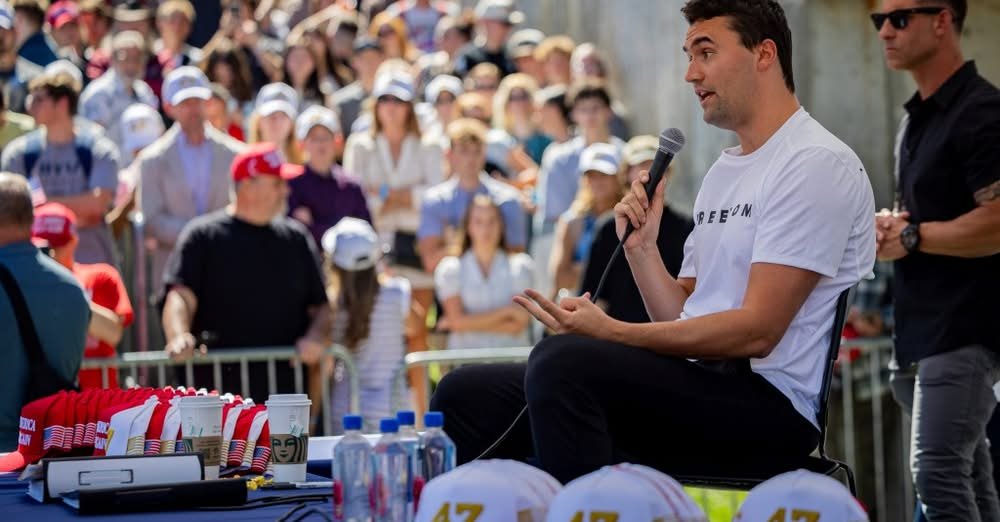The Charlie Kirk killing is not only a tragedy but also a warning. When a political activist is gunned down in broad daylight, the entire country should recognize that the foundations of democracy are in danger. Violence has entered spaces where debate once thrived. America cannot afford to normalize assassination as just another episode in its toxic culture war.
Context: The mainstream narrative of grief
On September 10, 2025, Charlie Kirk, the co-founder of Turning Point USA, was speaking at Utah Valley University in Orem, Utah. As he answered a question from the audience, a gunman fired from the rooftop of a nearby building. The bullet struck Kirk in the neck. His security team rushed him to a hospital, but doctors could not save him. He died later that afternoon.
Leaders from both parties condemned the killing. Donald Trump confirmed Kirk’s death, ordered flags lowered to half-staff, and called for prayer. Vice President J.D. Vance, Governor Gavin Newsom, House Speaker Mike Johnson, House Minority Leader Hakeem Jeffries, and Kamala Harris issued statements declaring that political violence has no place in America. The House of Representatives observed a moment of silence.
This was the official narrative: shock, unity, and ritual mourning. However, by framing it as a senseless act, the establishment avoided the deeper problem.
Oppositional Argument: This was not senseless—it was inevitable
The Charlie Kirk killing did not happen in isolation. It was the result of years of political hostility and cultural decay. America has built an environment where violence is increasingly likely.
Dehumanization has become a standard weapon in public discourse. Opponents are labeled traitors, extremists, or enemies of the state. Digital platforms reward outrage and punish nuance. Media outlets profit from endless division. When all of these elements converge, assassination becomes a matter of time.
Therefore, the claim that Kirk’s murder was “senseless” is misleading. It was predictable, given the climate that both politicians and media have allowed to fester.
Analytical Breakdown: Causes and consequences
Dehumanization as a political tool
Once a political figure is no longer seen as human, violence becomes thinkable. Kirk, as a conservative firebrand, was cast by many as an enemy of progress. That framing created a moral license for hatred.
The algorithm of outrage
Social media companies design systems that amplify the most divisive content. Outrage brings profit. Kirk built an audience in this environment, but it also fueled his enemies. The very tools that spread his message amplified the calls for his downfall.
Hypocrisy across the spectrum
Both left and right condemn violence when it harms their own but justify it when it strikes the other. After the Charlie Kirk killing, some voices online celebrated. This double standard shows that Americans have lost a shared moral ground.
Consequences for democracy
The consequences are profound:
- Citizens begin to fear speaking openly.
- Leaders limit access to public spaces.
- Extremists feel encouraged to escalate.
If such a trend continues, political murder will replace democratic debate.
Human Perspective: The cruelty of celebration
The cruelty of the reaction to Kirk’s death shocked many observers. On social media, people laughed, mocked his family, and framed the murder as justice.
Criticism of Kirk’s politics is legitimate. Celebration of his death is barbaric. When assassination is treated as entertainment, a nation abandons its humanity. Moreover, such reactions pave the way for more killings. If one side cheers now, the other will cheer when the violence is reversed. This cycle ends only in collapse.
Counterarguments
Some argue rhetoric is harmless without action. Yet rhetoric shapes the environment in which violence becomes possible. Others insist Kirk “brought it on himself” by polarizing society. That reasoning is dangerous. Free speech—even controversial speech—does not carry a death sentence in a democracy.
Finally, some point to America’s institutions as strong enough to withstand attacks. History proves otherwise. Repeated assassinations weaken trust, fracture communities, and accelerate authoritarian tendencies.
Historical parallels: Lessons from the past
The United States has seen assassinations before: Abraham Lincoln, John F. Kennedy, Martin Luther King Jr., and Robert Kennedy. Each event shook the country. However, those moments still produced collective mourning.
The difference today is stark. Instead of unity, the Charlie Kirk killing has deepened division. A portion of Americans grieve, while another portion rejoices. This lack of shared sorrow shows how fractured the national identity has become.
The role of media and institutions
Mainstream media outlets declared that “political violence has no place in America.” At the same time, these institutions thrive on conflict. Cable networks profit from outrage, and tech giants design platforms that radicalize users. Even universities, once arenas for debate, now serve as stages for confrontation.
By refusing to confront their own responsibility, institutions ensure that violence will not end.
The normalization of violence
The Charlie Kirk killing is not unique. Lawmakers have been attacked. Candidates have faced assassination attempts. Extremists target both conservatives and progressives. Each time, outrage is followed by forgetting. Each time, the abnormal becomes normal.
Unless this trend is stopped, America will accept political murder as part of daily life.
Conclusion: Draw the line before collapse
The Charlie Kirk killing is not just a conservative loss. It is a national crisis. If America allows murder to become another form of political expression, democracy will die.
The rule must be absolute: no excuses, no celebrations, no hypocrisy. Violence must be rejected everywhere, by everyone.
The death of Charlie Kirk is both a tragedy and a warning. The future of the United States depends on whether its citizens can finally draw a line and hold it.
External Links
- AP News: Charlie Kirk dies after campus shooting
- Reuters: Conservative influencer Charlie Kirk shot at UVU
